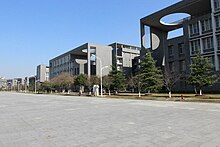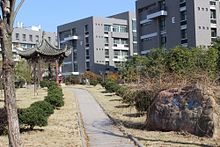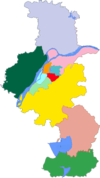China Pharmaceutical University
This article has multiple issues. Please help improve it or discuss these issues on the talk page. (Learn how and when to remove these messages)
|
中国药科大学 | |
 | |
Former names | National Pharmaceutical School |
|---|---|
| Motto | 精业济群[1] |
Motto in English | Be proficient and benefit others[2] |
| Type | Public university |
| Established | 1936 |
| Location | , , |
| Campus | Urban |
| Website | http://www.cpu.edu.cn/ |
 | |
China Pharmaceutical University (CPU) is a university in Nanjing, China that specializes in the pharmaceutical sciences. It is China’s first independent school of pharmacy and has been recognized as one of the best universities of pharmacy in China with a wide variety of specialized areas.[citation needed] It is one of the “Project 211” key universities affiliated with the Chinese Ministry of Education.
History
CPU was founded in 1936 as the National Pharmaceutical School.
Rank
According to the 2008 statistics of the Ministry of Education of China, CPU's Pharmacy discipline ranks No. 1 and Traditional Chinese Pharmacy discipline ranks No. 3 among all Chinese universities.
Competitiveness
The university spirit is “strict, practical, creative and cooperative.”[citation needed] CPU graduates are devoted in serving the society, and enjoy a high reputation from employers and the society. The employment rate tops among the higher institutions in China, about 99.8% for undergraduates, 100% for post-graduates, and 99.33% for vocational school students.[citation needed] The rate fluctuates little to the economic environment.
Campus
CPU is located in the ancient capital of Nanjing and comprises two campuses including Xuanwumen campus located in downtown Nanjing and Jiangning campus in the southeast outskirts of Nanjing.






Schools and departments
CPU consists of 6 schools (School of Pharmacy, School of Traditional Chinese Pharmacy, School of life science and Technology, School of International Pharmaceutical Business, School of Continuing Education, and School of Higher Vocational Education), 4 independent departments (Dept. of Basic Sciences, Dept. of Foreign Languages, Dept. of Social Sciences, and Dept. of Physical Education), and 5 key labs and centers at state or provincial levels.
Programs
CPU offers 20 bachelor’s degree programs, 29 master’s programs, 24 doctoral programs and 6 post-doctoral fellowship programs. There are three national key disciplines:[clarify] Pharmaceutical Chemistry, Pharmacognosy, Pharmaceutics and one provincial key discipline—Modern Traditional Chinese Pharmacy and Pharmacognosy.
Featured programs
Approved by the Ministry of Education, CPU established “Basic Pharmaceutical Science Base Class” and “National Bio-science and Technology Base Class”. Biological Technology Class (Bio-chemistry advanced class) is co-established with Nanjing University. The class has been recruiting students for 10 years and has cultivated a considerable number of high-quality talents. The class adopts a rolling system. Every year, about top 60% students are recommended for their master’s and doctoral study.[clarification needed (see talk)]
Faculty
Among the 530 faculty members, 2 are academicians (members of the Chinese Academy of Sciences and the Chinese Academy of Engineering), and more than 40% have advanced academic titles. So far, the university has undertaken more than 70 research projects financed by the State Key Programs Foundation, and more than 300 research projects financed by the State Natural Sciences Foundation and the State New Drug Research Foundation. There are also fundings from other national, provincial and municipal departments. Many projects have reached the international level and filled the gaps in the country’s pharmaceutical field.
Students
At present[clarify], CPU has 12,852 full-time students, including 83 international students from more than 40 countries. CPU is the only institution that is authorized by the Ministry of Education to admit full-time pharmacy students, continuing education students and senior visiting scholars from overseas. It is also one of the higher educational institutions in the mainland for students from Hong Kong, Macao and Taiwan.
International
The university is also active in international academic exchanges. It has made academic exchange agreements with more than 30 higher education institutions in different countries and regions of the world, including Japan, the United States, UK, Australia, Italy and Hong Kong. In addition, it maintains academic relationships with research institutions and universities in more than 40 countries and regions.
See also
- Pharmacy in China
- Pharmaceutical industry in China
- List of medical schools in the People's Republic of China
References
- ^ "学校简介 (in Chinese)". CPU. Retrieved 2015-11-04.
- ^ "Overview". CPU. Retrieved 2015-11-04.

